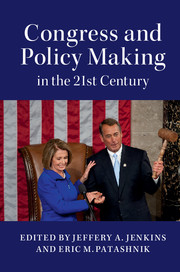Book contents
- Frontmatter
- Contents
- List of Figures
- List of Tables
- List of Contributors
- Acknowledgments
- 1 The Evolving Textbook Congress: Polarization and Policy Making on Capitol Hill in the 21st Century
- PART I CONGRESSIONAL POLICY MAKING IN A POLARIZED AGE
- PART II CONGRESS AND SOCIETY
- PART III CONGRESS AND ECONOMIC POLICY
- 6 Congress Makes Tax Policy: Democrats and Republicans at Two Critical Junctures
- 7 The Decline of Regular Order in Appropriations: Does It Matter?
- 8 Congress and the Federal Reserve: Independence and Accountability
- PART IV CONGRESS AND DOMESTIC POLICY DILEMMAS
- PART V REFLECTIONS
- Index
- References
6 - Congress Makes Tax Policy: Democrats and Republicans at Two Critical Junctures
from PART III - CONGRESS AND ECONOMIC POLICY
Published online by Cambridge University Press: 05 February 2016
- Frontmatter
- Contents
- List of Figures
- List of Tables
- List of Contributors
- Acknowledgments
- 1 The Evolving Textbook Congress: Polarization and Policy Making on Capitol Hill in the 21st Century
- PART I CONGRESSIONAL POLICY MAKING IN A POLARIZED AGE
- PART II CONGRESS AND SOCIETY
- PART III CONGRESS AND ECONOMIC POLICY
- 6 Congress Makes Tax Policy: Democrats and Republicans at Two Critical Junctures
- 7 The Decline of Regular Order in Appropriations: Does It Matter?
- 8 Congress and the Federal Reserve: Independence and Accountability
- PART IV CONGRESS AND DOMESTIC POLICY DILEMMAS
- PART V REFLECTIONS
- Index
- References
Summary
Clashes over tax policy have moved front and center in U.S. politics in recent years, reaching a crescendo in the 2012 election. That contest featured debates over the number of Americans who paid no federal income tax, scrutiny of Republican presidential candidate Mitt Romney's low effective federal tax rate, and assessments of the distributional implications of tax cuts proposed in the budget championed by Republican vice presidential candidate Paul Ryan. After President Obama was reelected, Democrats and Republicans immediately went to war over the future of big tax cuts inherited from his White House predecessor, Republican President George W. Bush.
Using the unique – and temporary – leverage afforded by the legal expiration at the end of 2012 of those major tax cuts, President Obama and Congressional Democrats managed to force Congressional Republicans to accept some tax rate hikes applicable to the very wealthiest Americans, though most of the top-heavy Bush tax cuts survived. After that, however, Republicans reasserted their adamant opposition to any revenue increases. And taxes have remained a flashpoint of partisan warfare in ongoing Congressional standoffs over budgets, spending sequesters, and proposals for deficit reduction. As Republican House Speaker John Boehner declared shortly after making the deal with President Obama at the end of 2012, the President “got his tax hikes on January 1 … talk about raising revenue is over” (Politi 2013). Senate Minority Leader Mitch McConnell reinforced the point that, from the GOP perspective, that deal was the “last word on taxes” (Kapur 2013).
How did we get here? In particular, why have Democrats had such a hard time raising revenues or restructuring the politics of tax decisions to fit their preferences for adequately funded government – even when the prevailing political and economic conditions suggest that shifts could occur? This question is especially pressing given the ongoing contribution of the Bush tax cuts to rising income inequality (CBPP 2012). Eliminating the tax cuts for well-off Americans would have been one clear way that Democrats could have weighed in against inequality. Democratic shortfalls are also puzzling in light of Barbara Sinclair's argument in Chapter 3 of this volume that unified partisan control of government makes passage of nonincremental legislation easier in an era of high and rising political polarization.
- Type
- Chapter
- Information
- Congress and Policy Making in the 21st Century , pp. 137 - 161Publisher: Cambridge University PressPrint publication year: 2016

